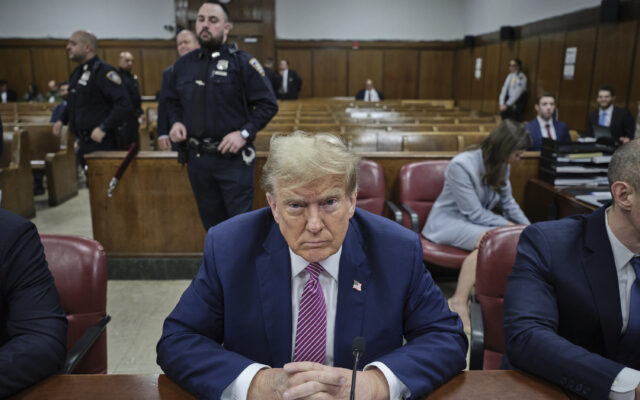Farm News for Thursday, March 19th, 2020

Farm Bureau Highlights Immediate Challenges Facing the Agriculture Sector
The American Farm Bureau has released its first assessment of the impact on farmers and ranchers in the wake of the national mitigation efforts to combat COVID-19. In a letter to Agriculture Secretary Sonny Perdue, AFBF President Zippy Duvall pledged, “America’s farmers and ranchers will be with you every step of the way.” The letter, which will be updated as new issues materialize, outlines concerns from Farm Bureau members across the country. Those concerns include H-2A labor issues, With the State Department’s announcement to suspend all processing of new, non-emergency visa applications in Mexico, U.S. farms and ranches could face a serious labor shortage at a critical time for planting and harvesting crops essential to the domestic food supply. Additionally, AFBF noted supply chain concerns and market concerns. Duvall noted concerns from livestock producers regarding market manipulation and urged USDA to monitor the situation to protect ranchers and consumers alike from price manipulation.
*************************************************************************************
NPPC Renews Call for Labor Solutions
The National Pork Producers Council Wednesday renewed its call for government help to prevent a severe labor shortage from becoming a crisis. The decision by the U.S. State Department to suspend visa processing in Mexico threatens to worsen the labor shortage in the pork industry and across U.S. agriculture, according to the organization. Mexico is an important source of labor for U.S. hog farmers and packing plants. NPPC President Howard “A.V.” Roth says, “we are very concerned” about the State Department’s action and its implications on the U.S. pork industry. The pork industry, a farm sector that operates year-round, uses the H-2A visa program for specialized work, but cannot use the program for most labor needs because of its seasonal limitation. Hog farmers are major users of the TN visa program, which taps labor from Mexico. NPPC also seeks clarifications from the U.S. Department of Transportation that farms are part of the critical domestic infrastructure needed to produce the food that feeds America and the world.
*************************************************************************************
Senators Seek COVID-19 Federal Help for Rural Areas
A group of farm-state Senators seeks additional assistance from federal agencies for rural areas to cope with COVID-19. 24 Senators penned a letter to the Department of Interior and the Federal Emergency Management Agency, along with the Department of Homeland Security earlier this week. The letter requests “immediate assistance in mobilizing agencies to offer coordinated support for rural counties, municipalities, and tribal communities as they respond to the coronavirus.” The lawmakers say rural communities are working to set up local emergency operation centers to help manage their response, but face challenges with limited staff capacity. The letter states, “some communities are already overwhelmed with the challenge.” Throughout rural America, the Department of the Interior and the Department of Agriculture employ thousands of federal civil servants who have the relevant experience to assist with emergency response. With this expertise available, the lawmakers say, ”it is crucial that the Federal Emergency Management Agency provide the authorities necessary and work with both agencies to deliver effective, coordinated assistance to rural communities.”
*************************************************************************************
Restaurant Industry Seeks Federal Help
The National Restaurant Association Wednesday asked President Donald Trump and Congress to take steps to provide the restaurant industry relief. The letter outlined the projected economic impacts of at least $225 billion during the next three months, with job losses of 5-7 million jobs, stemming from COVID-19. The letter outlined a dozen steps, including three separate categories of protection for industry restaurants and employees, including directed/targeted financial relief, loans/insurance options for impacted small businesses, and tax measures. Sean Kennedy, National Restaurant Association Executive Vice President of Public Affairs, says, “We are revising our business model to provide meals in different ways, takeout, delivery, safety-enhanced dine-in, but we are facing economic headwinds that will lead many restaurants to shut down operations, lay off workers, and end service in our communities.” Kennedy adds, the proposals in the letter, “ensure that restaurants have increased liquidity and access to necessary financing to help the industry and its employees recover.”
*************************************************************************************
Grassley, Tester Call on USDA to Address Rule Change
Two farm-state Senators want the Department of Agriculture to change a rule in the Packers and Stockyards Act. Senate Republican Chuck Grassley of Iowa and Senate Democrat Jon Tester of Montana recently sent a letter to Agriculture Secretary Sonny Perdue requesting USDA “clarify an ambiguous proposed rule regarding the undue and reasonable preferences provision of the Packers and Stockyards Act.” Grassley and Tester are urging USDA to ensure the new rule protects small livestock and poultry farmers from unreasonable practices of packers and poultry companies. In their letter, they outlined specific changes to address this proposed rule. The Senators say the current rule, “not only fails to address many of these abusive and unreasonable industry practices, but it actively establishes criteria insulating packers and poultry companies from scrutiny.” The rule also appears to provide legal protection for packers who are able to justify a practice based on the need to save costs and reduce prices, or if their practices are deemed “customary” in the industry because they align with those of their competitors.
*************************************************************************************
NCBA Seeks BQA Awards Nominations
The National Cattlemen’s Beef Association seeks nominations for National Beef Quality Assurance awards. The 2020 National BQA Awards recognize five winners in the areas of beef producer, dairy, marketing and education. The awards, “demonstrate the pride we all have in the work being done to enhance our industry and the products we provide to consumers,” according to Glen Dolezal of Cargill Protein. The National BQA Awards are selected by a committee of BQA-certified representatives from universities, state beef councils, sponsors and affiliated groups. Nominations may be submitted by organizations, groups or individuals on behalf of a U.S. beef producer, dairy producer, marketer or educator. Individuals and families may not nominate themselves, though the nominees are expected to be involved in the preparation of the application. Past nominees are encouraged to submit their application under the new nomination structure. Previous winners may not reapply. The Deadline for nominations is June 5, 2020. The National Cattlemen’s Beef Association manages the BQA program as a contractor to the Beef Checkoff Program. For more information, visit BQA.org.
*************************************************************************************
IOWA CATTLEMEN REQUEST ASSISTANCE
The Iowa Cattlemen’s Association (ICA) sent a letter this morning to Iowa’s congressional delegation and U.S. Secretary of Agriculture Sonny Perdue, asking for a stimulus package designed to assist cattle producers.
“We’ve heard from our members across the state that the market fall-out from COVID-19 has put the future of their family farms at risk,” says Matt Deppe, CEO of the Iowa Cattlemen’s Association. “This ‘black swan’ event comes just a few months after a similar market crash in August following the Tyson plant fire in Holcomb, Kansas.”
In the past week, boxed beef prices have increased, while fed cattle trade and live cattle futures markets have plummeted. Concerns over future beef demand, availability of feedstuffs, and potential processing disruptions have added to uncertainty in the beef community.
ICA staff and leaders have been in daily contact with governmental agencies including USDA’s Agricultural Marketing Service (AMS) and the Iowa Department of Agriculture and Land Stewardship. The organization has also been collaborating with other cattlemen’s associations across the country, and been in contact with the Iowa Banker’s Association, Iowa Department of Economic Development and Iowa Department of Public Health.
In addition to the letter asking for immediate assistance, ICA continues to work on long-term solutions to provide more transparency and price discovery in the fed cattle markets.
The full text of the letter is as follows:
Dear Senator Grassley and Senator Ernst,
While COVID-19 is affecting many people worldwide, our focus at the Iowa Cattlemen’s Association is on how it has (and will continue to) affect Iowa’s cattle producers. The short-term effects on the cattle markets have been extreme by all accounts, and the long-term effects are uncertain.
Iowa is a major beef producing state with over 25,000 beef producers and nearly 4 million head of cattle as of January 1, 2020. The beef cattle industry greatly contributes to Iowa’s economy by generating approximately $4 billion in cash receipts for cattle and calves, equal to nearly 15 percent of all Iowa agricultural cash receipts. Agriculture, including beef production, is the lifeblood of our state.
The COVID-19 national emergency has affected our U.S. cattle markets for several weeks now, most significantly between March 12, 2020 and March 18, 2020. According to U.S. Department of Agriculture reports, boxed beef cutout values added nearly $40—rising to levels not seen since shortly after the Holcomb plant fire last August. While demand indicators currently appear strong, price support in the fed cattle trade and live cattle futures trade has drastically fallen. With live cattle futures experiencing sharp decline—hitting 10-year lows—and boxed beef on the rise, many Iowa cattlemen find themselves questioning how long they can weather the current losses. While the overall impact of COVID-19 on the beef cattle industry is unclear, it seems clear to producers that there is a stark contrast between their livelihoods as price-takers, and that of the price-makers.
For the sake of our beef producers, rural economies, and food security, it is of the utmost importance that all segments of the beef supply chain continue to operate as normally as possible. From feed supplies to harvest and processing, there are many factors required for the production of beef and the solvency of our industry.
As our government works to mitigate the issues caused by the COVID-19 outbreak, the Iowa Cattlemen’s Association asks that the current and future needs of beef producers are taken into consideration. Specifically, we are requesting stimulus solutions to protect the long-term viability of our family-run operations, which support our local, state, and national economies. Furthermore, we encourage you to monitor market participation for anti-competitive practices (past and future) and look for your support of solutions that will improve transparency and price discovery for all in the U.S. cattle markets.
Thank you for your continued support of the beef cattle industry. As the COVID-19 outbreak continues to unfold, we stand ready to assist in any way possible.
Sincerely,
Richard Godfrey
Iowa Cattlemen’s Association President
CC:
The Honorable Sonny Perdue, Secretary, USDA
Representative Abby Finkenauer, IA-1
Representative Dave Loebsack, IA-2
Representative Cindy Axne, IA-3
Representative Steve King, IA-4



